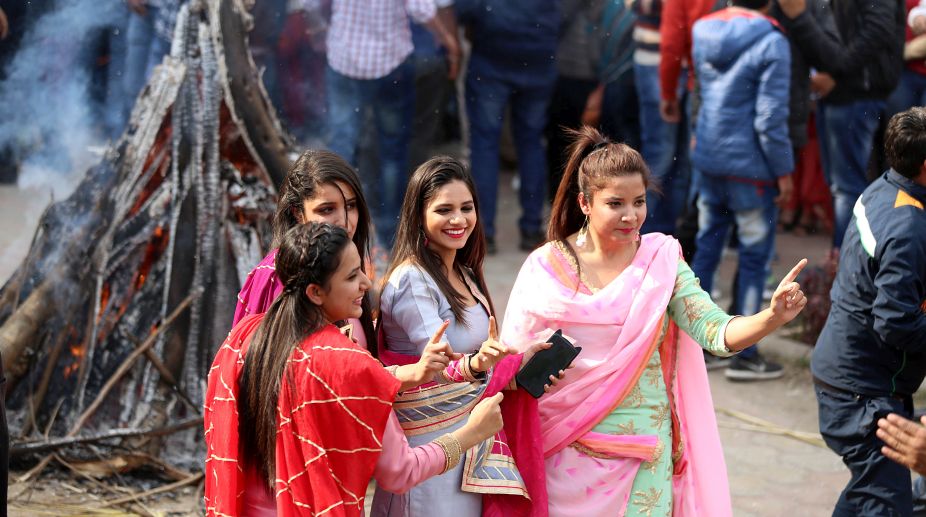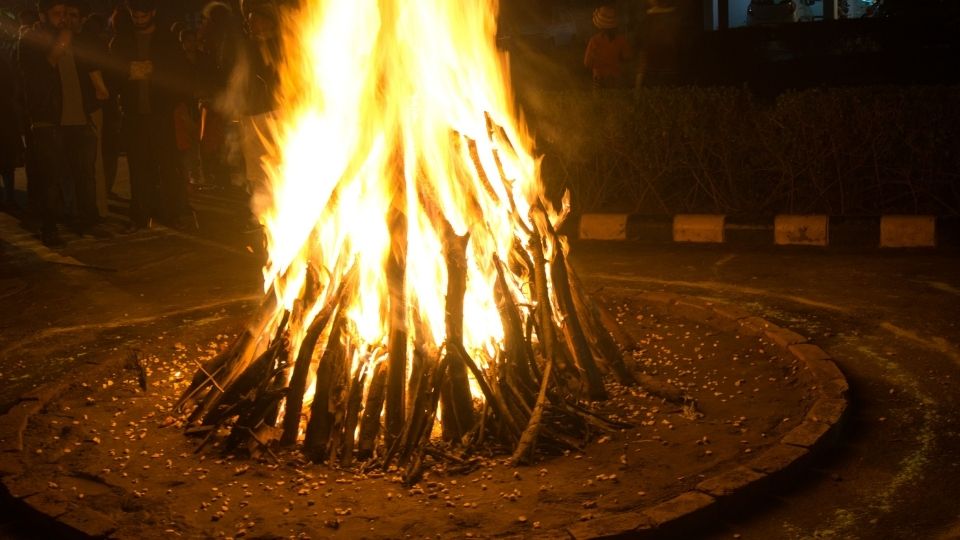There are few renowned legends associated with this historic festival of Punjab, the most significant of them being the Dullah Bhatti, which evolved around the Festival of Lohri. Lohri marks the end of the dreary and awfully cold month of Pos (mid Dec to mid Jan) and the next day of Makar Sakranti, ushers in the bright and sunny month of Magh. This is particularly a happy occasion for the couples who for the first time celebrated Lohri after their marriage and also the first Lohri of the son born in a family.
Few days before Lohri, a bevy of village maidens assemble and visit the households to ask cow-dung cake. The girls gather round the house and chant: We've come, all the girls of the village! We've come to your courtyard! And so they go from house to house collecting cow-dung cakes till they have a veritable pile. They deposit all of them in one house and return to their homes. Their is a valid reason for girls to perform this ritual.

Lohri is celebrated on the last day of the month of Pans to mark the end of winter. It is said that the forefathers formulated a sacred mantra which protected them from the cold. This mantra invoked the Sun God to send them so much heat that the winter cold would not affect them. And, in thanks-giving to the Sun God, they chanted this mantra round a fire on the last day of Pans. The Lohri fire is symbolic of the homage to the sun. A song is sung on this occasion:
“Where have the shawls and braziers gone?
To the golden mountain Where's the golden mountain gone?
To the sun's ray Where has the sun's ray gone?
To the sun Where's the sun gone?
To the fire The fire burns, the ray warms
The snows melt, the cold days have ended.”
Our ancients believed that the flames of the fires they lit took their message to the sun, and that is why on the morning after Lohri, which is the first of the new month Magh, the sun's rays suddenly turn warm and take the chill out of people’s bones.
"There is also another version of Lohri. In olden times, human beings lit fires to keep away flesh-eating animals and protect their habitations. Everyone contributed to this communal fire, for which young boys and girls collected firewood from the jungle. That is why even today when people burn cow-dung cakes it is teenagers who go around collecting them. The Lohri bonfire is symbolic of our old method of protecting ourselves as well as a form of fire worship. It is to the Lohri fire that couples pray for more children and parents for husbands for their unmarried daughters.
On the eve of Lohri the most popular songs sung by groups of boys invariably end with the exclamation 'ho':
Sundri Mundri Hei! Hoi!
Tera Kaun Bechara! Hoi!
Dullah Bhatti wala! Hoi!
Dullah Di Dhi viyahi ! Hoi !
Sher ShaKar pai! Hoi!
Kuri de Mamme aaye! Hoi!
UnaNe ChuRi Kuti! Hoi!
Jimidari Lutti! Hoi!
Ik kola GhuT Gaya!
Jimidar Apni......
Since Lohri is also associated with weddings, many Lohri songs are based on the old love story of Dulla Bhatti. This is the tale of a man who rescued a girl from her cruel abductors and adopted her. Finally he arranged for her marriage, as if she were his own daughter. These songs exhort the youth to protect the honor of their sisters and daughters, and punish those who try to dishonor them. Everywhere in Punjab ‘Vars’ (songs) of his heroism and valor are sung and recited.

Copyright © 2004- www.lohrifestival.org. All Rights Reserved